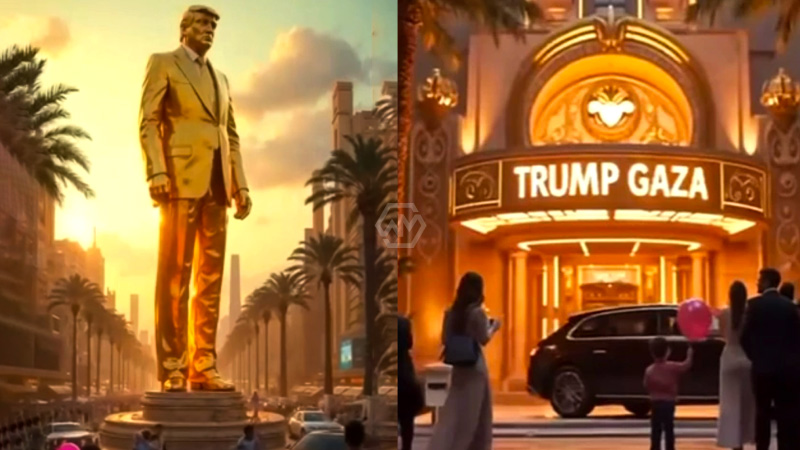- Donald Trump shared an AI-generated video envisioning a futuristic, resort-style Gaza named “Trump Gaza.”
- The video features golden Trump statues, Elon Musk showering cash, and a bizarre AI-generated song.
- Critics slammed the clip as tone-deaf and riddled with AI mistakes, including bearded belly dancers and unrealistic depictions of a rebuilt Gaza.
The AI-generated video, shared by Trump on Truth Social, presents a surreal vision of Gaza transformed into a glitzy, Dubai-style resort city. From Tesla-filled streets to Trump-branded skyscrapers, the video paints a utopian picture that starkly contrasts the war-torn reality of the region.
The clip quickly went viral, but for all the wrong reasons. Viewers ridiculed the absurd visuals, particularly the unflattering AI-generated Trump dancing with a woman in a revealing dress and Netanyahu sunbathing in a speedo.
Trump’s AI Vision for Gaza: A Political Fantasy Gone Wrong
Trump’s AI-generated depiction of a rebuilt Gaza raises ethical concerns about the use of artificial intelligence in political messaging. The video erases the ongoing humanitarian crisis and replaces it with a fantasyland of luxury hotels, neon-lit streets, and oversized Trump statues. This unrealistic portrayal has sparked criticism from political analysts, who argue that it trivializes the suffering of Gazans and ignores the complex realities of post-war reconstruction.
The inclusion of Elon Musk, who is shown throwing money and dancing, has also been widely mocked. Some have speculated whether Musk had any prior knowledge of the video, while others see it as yet another example of Trump leveraging his high-profile connections for political spectacle. The AI’s clumsy rendering of characters—including an overweight Trump and bizarre bearded belly dancers—only adds to the perception that the video is more of a parody than a serious proposal.
Despite the video’s intention to project a positive image of Trump’s leadership, it has instead fueled criticism of his detachment from reality. The use of AI-generated visuals to create an alternate future for Gaza has been condemned as both misleading and insensitive. Critics argue that this type of digital propaganda sets a dangerous precedent, especially when used by world leaders to shape public perception.
Furthermore, the AI-generated song praising Trump—“Donald is coming to set you free, bringing the light for all to see”—has been particularly controversial. Many see it as an attempt at self-glorification, reducing a real-world humanitarian crisis to an over-the-top spectacle. The video’s bizarre nature and the overwhelming backlash suggest that, rather than boosting Trump’s image, it has further alienated many viewers.
Trump’s AI-generated “Trump Gaza” video has backfired, exposing the dangers of artificial intelligence in political messaging. Instead of inspiring confidence, it has sparked widespread mockery and criticism, highlighting the disconnect between digital propaganda and real-world suffering.
“The great enemy of truth is very often not the lie—deliberate, contrived, and dishonest—but the myth—persistent, persuasive, and unrealistic.” — John F. Kennedy



